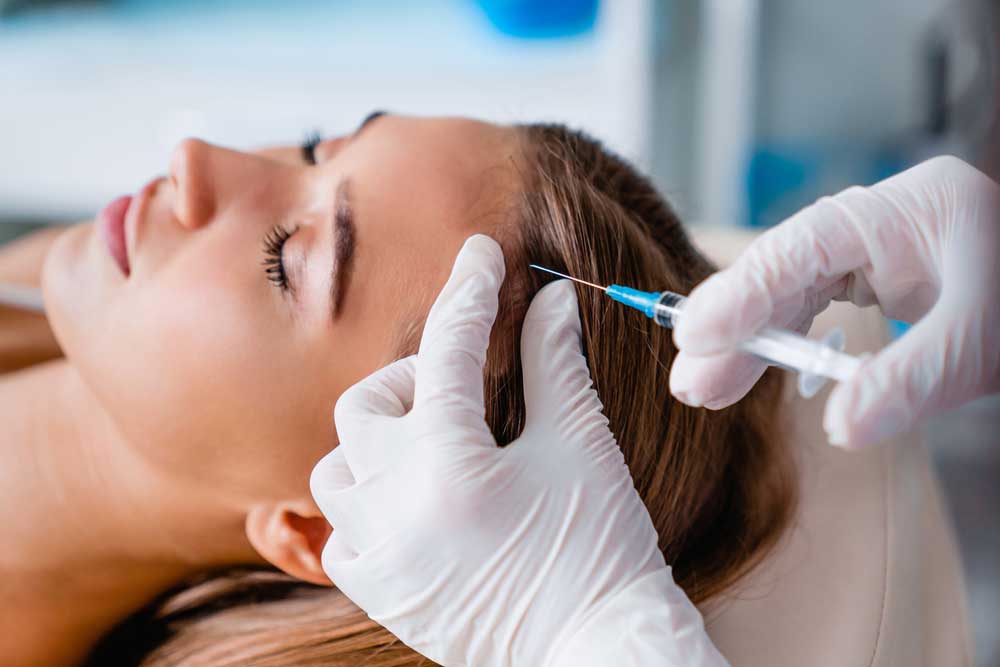Hair loss is a popular concern in the United States that affects people anywhere between the ages of 18-50 years old. According to one study, by the age of 50, around 85% of American men experience hair thinning. Hair loss or male pattern baldness affects the scalp area of the body. Several factors can cause hair loss, including hormonal changes, medical conditions, or aging. Hair loss is a common issue that is found among men.
Addressing hair loss varies from person to person. Some people prefer to let it untreated, while others may go for different hairstyles and makeup in response to the change. However, treatments are available for hair growth in men. According to a study, 12.94 million Americans will use hair regrowth products by 2024. There are many hair restoration treatments available. The first step is to address the cause and decide on the treatment plan.
Let’s talk more about hair thinning!
What Is the Average Age of Hair Loss?
It is difficult to predict the exact age at which a person starts to experience hair loss. Typically, hair loss can start as soon as the person enters teenage life or might not occur until the person retires. Generally, people begin noticing signs in their 30s and 40s. However, in some cases, significant hair loss often happens later in life.
Hair Loss in Your 30s and Over
Although hair loss is associated with aging, a growing number of young millennials today are experiencing hair loss. Hormonal changes, chronic diseases, thyroid conditions, and stress are some known causes of hair loss in the young generation.
The following are some common causes of hair loss in people in their 30s:
1. Stress
The most common reason for hair loss in millennials is severe stress. Stress can send hair follicles into the resting phase, making them fall out within a few months while combing and washing.
2. Chronic Medical Conditions
Some medical conditions can cause hair loss. These include thyroid disorders such as hypothyroidism or hyperthyroidism, fungal infections in the scalp, lupus, autoimmune diseases, hormone imbalances, and other conditions.
3. Nutritional Deficiencies
Hair loss can also happen due to the deficiency of certain essential vitamins, minerals, or nutrients in the body. For instance, zinc, iron, biotin, and protein deficiency are leading causes of hair thinning.
4. Irregular Dietary Changes
Irregular dietary changes can have negative effects on hair. Irregular dietary changes can make the body lose weight. Secondly, such changes create a nutritional deficiency in the body, further leading to hair loss.
Hereditary vs. Non-Hereditary Hair Loss
1. Hereditary Hair Loss
Hereditary factors are the most common reason for hair loss. The disorder is also called androgenetic alopecia or male-pattern baldness. Hereditary hair loss is not exactly a disorder but a natural condition caused by genetics, hormonal levels, and aging.
Almost all men notice hair loss or hair thinning due to aging. However, they may notice it in the early stages of life, which typically begins around the 20s and 30s.
2. Non-Hereditary Hair Loss
Non-Hereditary hair loss consists of factors that are not genetic. These factors include:
- Stress
- Thyroid conditions
- Post-surgery
- Nutritional deficiencies
Sometimes an underlying medical condition can result in sudden hair loss. Diseases such as diabetes, lupus, and anemia, cause hair loss. Besides, chemotherapy or any major surgery can also cause temporary hair loss. Additionally, poor diet and eating disorders can result in hair loss.
Causes of Hair Loss in Men
Several factors constitute hair loss in men. However, some of these factors include:
- Genetical conditions or androgenetic alopecia
- Hair loss due to medication
- Stress
- Scalp infection
See Also: What’s the Best Hair Care Routine for Healthy and Thick Hair
What Is the Life Cycle of Hair Follicles in Men?
The follicles of hair growth are cyclical in nature. Stages of rapid growth and extension of the hair shaft alternate with periods; This is divided into four phases: growth phase (Anagen), transitional phase (catagen), resting phase (telogen), and losing phase (exogen).
- In Anagen, hair growth begins. It’s the longest phase, lasting up to 5 years for the hairs on the scalp, though a single hair could continue growing for seven or more years.
- In the Catagen phase, hair follicles shrink, and hair growth slows down. The hair also starts to separate from the bottom of the hair follicle.
- The telogen phase lasts around three months. An estimated 10 percent of scalp hairs remain in this phase. Hairs don’t grow, but they don’t usually fall out.
- The exogen phase is an extension of the telogen stage of hair growth. During this phase, hair is shed from the scalp, often helped by washing and brushing. Losing up to 50-100 hair strands is normal.
Hair Loss in Teenage and 20s
Many factors can cause hair loss in the teenage phase — stress, lack of sleep, vitamin deficiencies, poor scalp health, or male pattern baldness. However, you should consult a hair loss doctor near you to assess the conditions.
Hair Loss Prevention and Treatment
The following are the ways to treat and prevent hair loss:
- Consult with a doctor and start taking Minoxidil, as it will reduce hair loss speed.
- A prescription pill like finasteride can also benefit against hair loss.
- Platelet-rich plasma can boost hair regrowth in men.
- Surgical treatments like follicular unit transplant (FUT) and follicular unit extraction (FUE) can help to grow back hair.
For more information, reach out to hair growth treatment in Freehold, NJ.
Treatment Options at New Jersey Hair Restoration Center
The following are the treatment options for hair loss at NJHRC:
- FUE Hair Transplant
- FUT Hair Transplant
- Medical Management
- PRP Procedure
- PepFactor
- Laser Cap
You should always consult our hair transplant expert before starting any of these treatment options.
See Also: How Can I Prevent Hair Loss?
Get the Right Hair Loss Treatment at New Jersey Hair Restoration Center
Earlier, there were few treatment options available for hair loss in the market, whether the hair loss was hereditary or non-hereditary. However, with advanced treatment, hair loss is treatable. So, take your first step and connect with New Jersey Hair Restoration Center, one of the best hair transplant centers in Freehold, NJ.
With advanced technology and our expert dermatologists, we are the most trusted and first choice for hair loss solutions, as we provide various treatment options for your hair thinning. Book your consultation if you want to talk to our experts about your hair loss.


